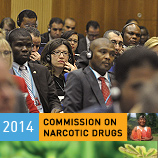 21 March 2014 - After seven days of discussion and debate on drug policy, the 57th Session of the Commission on Narcotic Drugs (CND) closed today with Member States adopting
11 resolutions.
21 March 2014 - After seven days of discussion and debate on drug policy, the 57th Session of the Commission on Narcotic Drugs (CND) closed today with Member States adopting
11 resolutions.
Addressing the assembled Member States in his closing speech, the Executive Director of the UN Office on Drugs and Crime (UNODC), Yury Fedotov, said that, over the past seven days, the world had gathered in Vienna to discuss the key challenges in drug policy.
He added, "The CND has also enabled us to strengthen our responses to such threats as drugs from Afghanistan and drug trafficking and consumption in West Africa."
Many of the resolutions passed by Member States cover such touchstone drug policy issues as alternative development, substance use disorders, new psychoactive substances, ensuring adequate services for drug abusers and evidence-based drug use prevention.
Additional impetus was given to alternative development through a resolution encouraging Member States to share their expertise and experience. In a speech at a side event on alternative development, held on 18 March, Yury Fedotov underlined the importance of this area to UNODC when he said, "We must keep in mind that when we are talking about alternative development, we are talking about small farmers faced with poverty, food insecurity, lack of land and instability, who, as a result, find no other option but to engage in illicit drug cultivation."
The 57th session of the CND began on 13 March with the High-Level Review and agreement on a Joint Ministerial Statement on the world drug problem. Following the weekend, on 17 March, it reconvened for the regular session of CND, which ended today. Over the last seven working days, as many as 1,300 participants from 127 UN Member States, intergovernmental organizations, UN bodies, civil society, and media attended the opening, plenary sessions, and numerous side-events.